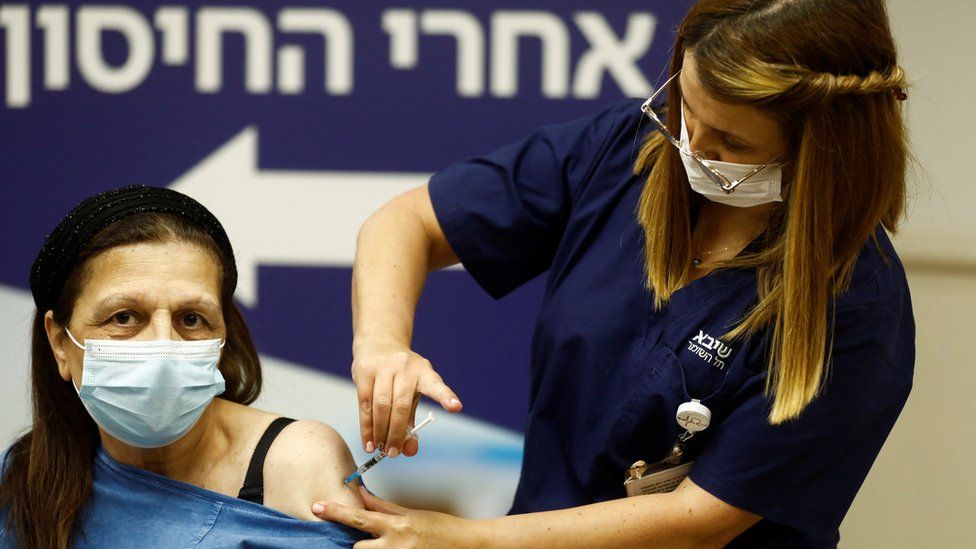Israel's Tight Race Against Omicron
"The [infection] numbers will have to be very high in order to reach herd immunity.""This is possible but we don't want to reach it by means of infections, we want it to happen as a result of many people vaccinating."Nachman Ash, Director-General, Health Ministry, State of Israel
 |
| Sheba Medical Centre, Israel |
In its ongoing battle to fend off the SARS-CoV-2 virus, Israeli government authorities and the country's top health official and medical authorizing body approved use of Merck & Co.'s antiviral pill for COVID-19 patients -- molnupiravir -- as yet another arrow in its quiver of pharmaceuticals meant to counter the predatory effects of the coronavirus devastating the country.
The latest iteration of a COVID mutant has sent world health authorities into a scramble as the Omicron variant lives up to its early reputation as a potentially more transmissible virus than its predecessors. Infections keep hitting new world records, currently seeing an average of over a million cases each day between December 24 and December 30, as revealed by Reuters data.
The only bright spark in an otherwise endless dance of evasion with this often-deadly virus is that despite rising numbers of cases everywhere in the world, deaths have not risen proportionate to the infection numbers, reflecting a change in both the virus's modus operandi and final effects. Great relief, tempered by a 'wait-and-see' caution has resulted in a exhalation of bated breath with the realization of coping with a less lethal adversary.
And in Israel, which in the early months of the original COVID-19 sweep through the world community became a leader in swift remedial action in hopes of taming the untamable, daily cases with Omicron are anticipated in the coming three weeks to reach record high infection rates. Like other nations, Israel celebrated, congratulating the efficacy of its swift action in the first wave, thinking the virus was tamed only to learn soon afterward this was wishful thinking.
Salman Zarka, head of the Israeli health ministry's coronavirus task force, expressed his belief that herd immunity was far from guaranteed, given experience in the past two years that demonstrated some COVID-19 patients who had recovered from their intimate acquaintance with COVID had nonetheless later been reinfected.
Conventionally, herd immunity represents a population peaking at the top majority number of infections rendering its capacity to further infect those still vulnerable, less likely to occur. The population becomes protected either through vaccination or by individuals developing antibodies by contracting the disease, in large enough numbers to qualify as a situation of having achieved herd immunity.
Of Israel's 9.4 million population, approximately 60 percent have been fully vaccinated, mostly with the use of the Pfizer/BioNTech vaccine, meaning they have either received three doses or have recently secured their second dose. Yet a remaining hundreds of thousands eligible in the population for a third inoculation appear to have hesitated.
Director-General Ash of the Health Ministry is considering a fourth vaccine dose for those over 60, with severe morbidity avoidance in mind, following its approval a week earlier for those who are immune-compromised and for elderly people in congregate-care homes. The use of molnupiravir for COVID-19 patients over the age of 18 has been authorized by the country's Health Ministry which had signed a supply contract with Merck.
The pharmaceutical pill has been shown to reduce hospitalization and death by around 30 percent in a clinical trial, authorized in the U.S. last month for high-risk adult patients. Statistics that convinced Israel to order 100,000 units as well of Pfizer's Paxlovid antiviral pill for those aged 12 and older who are at risk of serious disease.
 |
| Israel has approved a fourth vaccine dose for the immunocompromized and the elderly in care homes Reuters |
Labels: Herd Immunity, High Infection Rates, Israel, Omicron, Vaccinations

0 Comments:
Post a Comment
<< Home